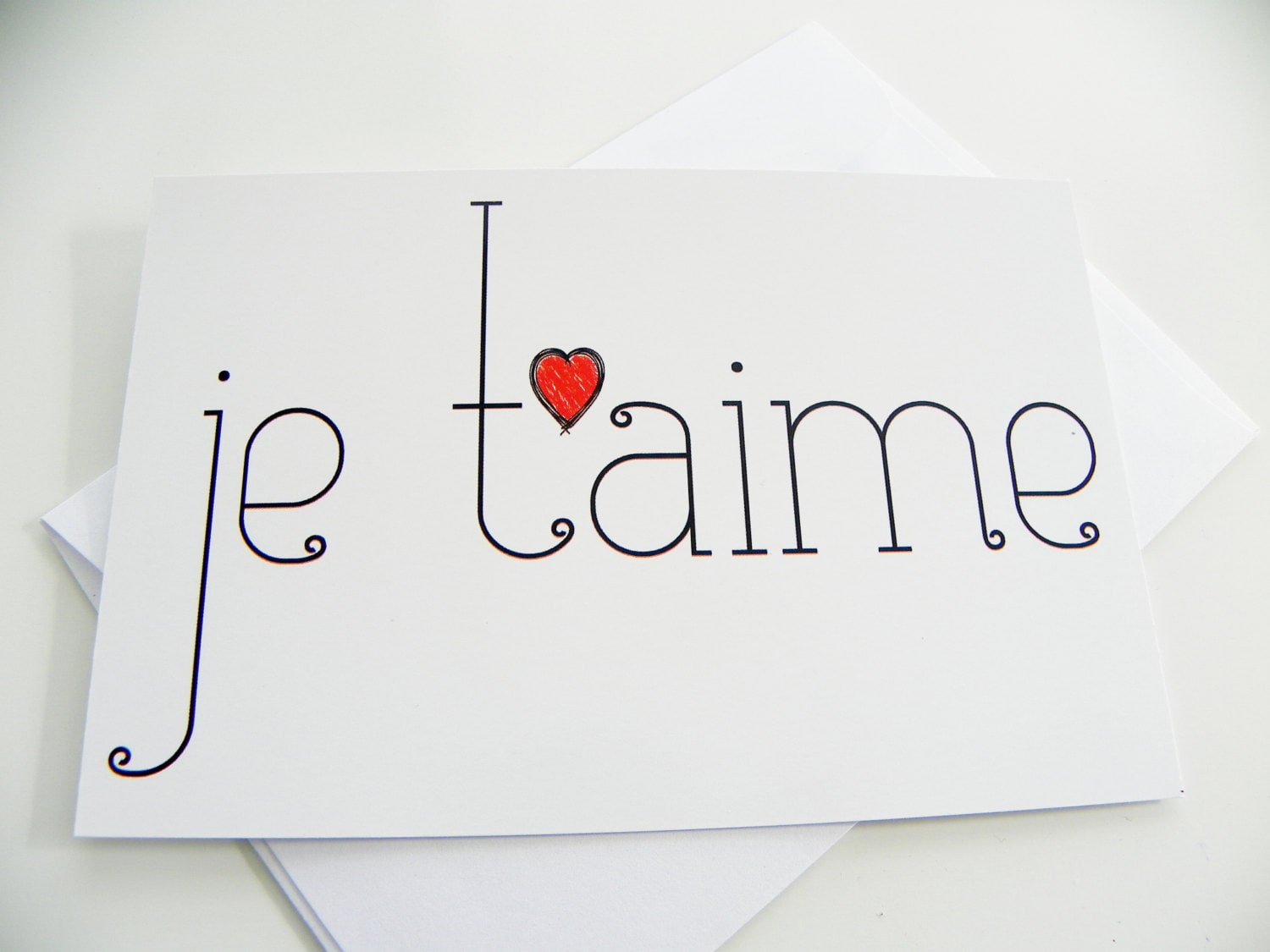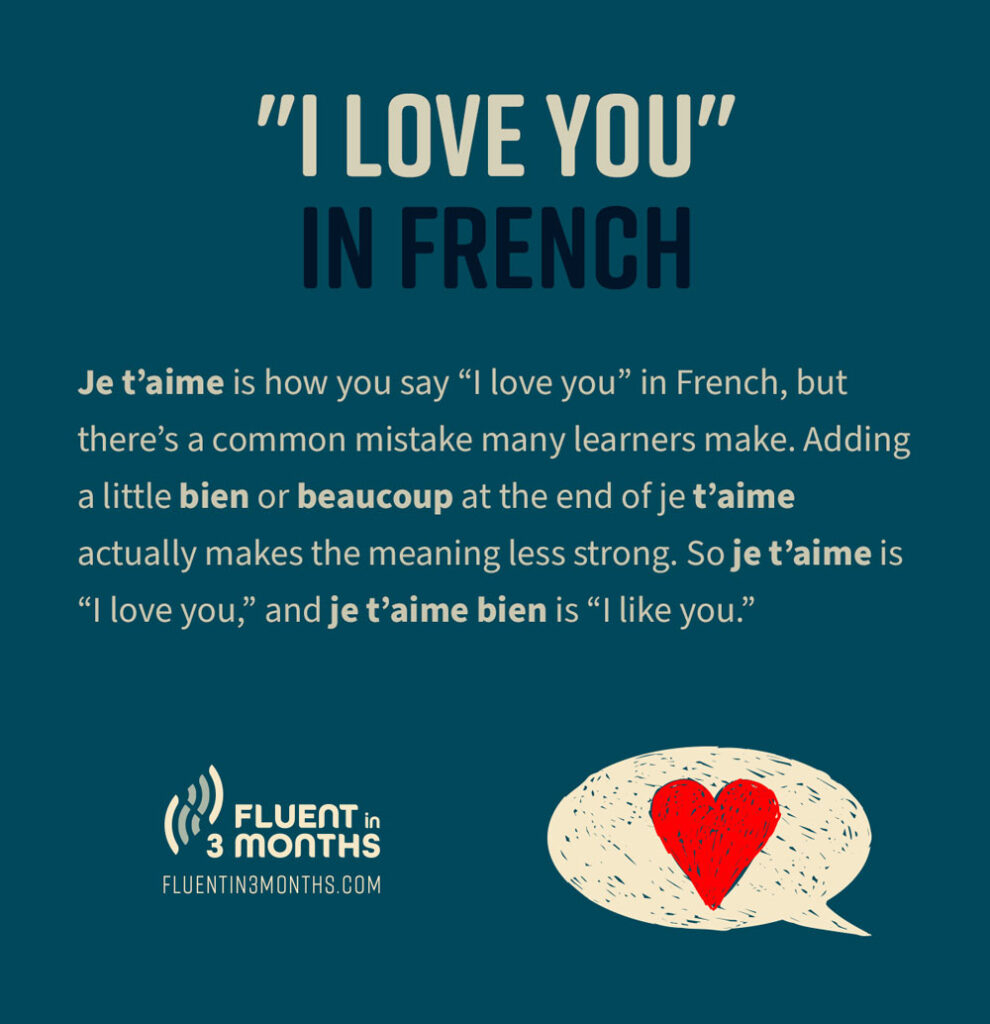Saying 'I Love You In French': Uncovering The Heartfelt Expressions
Expressing deep feelings, you know, it's a pretty big deal for us humans. This strong connection, this affection we feel for another person, a pet, or even a cherished object, it truly shapes so much of our lives. It's that feeling, you see, that sense of being drawn to someone, that emotional bond, and it comes out in so many different ways. In fact, it's a range of really powerful, good feelings, and finding just the right words to share that can make all the difference, couldn't it?
This deep affection, as a matter of fact, it grows out of personal connections or family ties, and it really is a central part of what makes us who we are. We often look for special ways to show this feeling, don't we? So, when you think about it, learning to share these feelings in a new language, like French, can be a rather wonderful experience.
Today, you know, we're going to explore what it means to say "I love you in French," looking beyond just the most famous phrase. We'll get into the different ways you can express affection, the cultural touches, and how these words can truly deepen your connections. It's about finding that perfect way to communicate what’s in your heart, honestly.
- Huge And Natural Boobs
- Roselyn Sánchez Movies And Tv Shows
- Thank You In Spanish
- La La Land Cafe
- Dairy Queen Grill Chill
Table of Contents
- The Heart of Love in French: "Je t'aime"
- Different Shades of Affection: Other French Love Phrases
- When to Say It: Cultural Considerations
- Practicing Your French Expressions of Love
- Your Questions Answered About Love in French
The Heart of Love in French: "Je t'aime"
When most people think about how to say "I love you in French," the phrase "Je t'aime" is usually the first thing that comes to mind, isn't it? And that's pretty much right, as it's the most direct and widely recognized way to express romantic love. This phrase, you know, it carries a lot of weight and feeling, truly embodying that strong affection we feel for another person. It really is a simple yet incredibly powerful statement, meant for those special connections that mean the world to you.
Saying It Just Right: Pronunciation Tips
Getting the sound of "Je t'aime" just right can actually make a big difference, you know. It's not just about the words themselves, but how they come out. The "Je" part, it sounds a bit like the "s" in "measure" or "vision." Then there's "t'aime," which sort of sounds like "tem," but with a soft "m" at the end that almost disappears into a nasal sound. You want to make sure the "e" at the end of "aime" is silent, really. Practicing this, you know, can help you sound more natural and sincere. A good way to get it, you know, is to listen to native speakers say it, perhaps in French songs or movies, just to catch the rhythm and the gentle flow of it all.
More Than Romance: The Nuances of "Je t'aime"
Here's a little secret about "Je t'aime": while it's definitely the phrase for romantic love, it also has a slightly softer cousin, "Je t'aime bien." This second phrase, you see, it's used for expressing affection towards friends, family members, or even a casual acquaintance you quite like. It's more like saying "I like you a lot" or "I'm fond of you," you know? So, you wouldn't typically say "Je t'aime" to your best friend unless you had romantic feelings, but "Je t'aime bien" would be perfectly appropriate. It's a small difference in words, but it really makes a big difference in meaning, doesn't it? This distinction is quite important, actually, to avoid any awkward misunderstandings.
- Four Seasons Orlando Baby
- How Did Coach Wall Die
- Cast Of Kpop Demon Hunters
- Cách Tạo Tài Khoản Flow
- Thundr Omegle
Different Shades of Affection: Other French Love Phrases
Love, you know, it's a really broad emotion, encompassing so many different types of strong, positive feelings, as my text says, from deep attraction to just simple affection. So, it makes sense that there wouldn't just be one way to say "I love you in French," right? The language offers a lovely variety of expressions, allowing you to show your feelings in ways that fit the relationship, whether it's a deep romantic bond or a warm friendship. It's about picking the right words for the right moment, really.
For Friends and Family: Showing Care
Beyond "Je t'aime bien," there are other lovely ways to show care and affection for the people who matter in your life. For instance, you could say "Je tiens à toi," which literally means "I hold to you," but it truly expresses a deep sense of care and attachment, you know, like "You mean a lot to me." This phrase, it's very versatile and warm, perfect for close friends or family members where "I love you" might feel a bit too intense. Another simple but sweet way is "J'adore," which means "I adore." While it can be used for things, like "J'adore le chocolat" (I adore chocolate), you can also use it for people in a less intense, but still very affectionate way, particularly for children or pets, you know, just showing that strong fondness. It's about showing that someone is truly cherished, really.
For Your Sweetheart: Deepening the Bond
When it comes to romantic love, there are, you know, even more beautiful phrases to add to your vocabulary beyond just "Je t'aime." To express a very deep and passionate love, you might say "Je suis fou/folle de toi," which means "I'm crazy about you." The "fou" is for a male speaker, and "folle" is for a female speaker, just so you know. This really conveys a strong, almost overwhelming feeling. Then there's "Tu es l'amour de ma vie," meaning "You are the love of my life," which is a really profound statement, isn't it? It speaks to a lasting and central affection. For a more tender expression, you could say "Je pense à toi," which means "I think of you," showing that someone is constantly on your mind. These phrases, you know, they help paint a fuller picture of your feelings, adding different textures to your expression of love. You can learn more about romantic expressions on our site, actually, to truly expand your heartfelt vocabulary.
Terms of Endearment: Sweet Names
Just like in English, the French language has a delightful collection of sweet names, or "noms d'amour," that people use for their loved ones. These are really common, you know, and they add a personal, tender touch to your communication. Some popular ones include "mon amour" (my love), "mon chéri" (my darling, for a male) or "ma chérie" (my darling, for a female). Then there's "mon cœur" (my heart), which is really quite lovely, isn't it? And, you know, some people even use animal names, like "mon chaton" (my kitten) or "ma puce" (my flea), which might sound a bit odd to English speakers, but they are genuinely affectionate in French. Using these, you know, can really make your expressions of love feel more natural and intimate, showing a deeper level of closeness, really.
When to Say It: Cultural Considerations
The timing and context for saying "I love you in French" are, you know, quite important, just like with any deep emotional statement. French culture, in some respects, tends to be a bit more reserved about expressing such strong feelings openly, especially in the early stages of a relationship. While it's a fundamental human emotion, as my text points out, the way it's expressed can differ. You might find that "Je t'aime" is typically reserved for when a relationship has truly deepened and become serious, you know, not something said on a first or second date. It's usually a significant step, a real marker of commitment. So, it's generally a good idea to let the relationship progress naturally and feel out the moment, rather than rushing into it. This thoughtful approach, you know, shows respect for the depth of the words and the relationship itself, really.
Practicing Your French Expressions of Love
Learning to say "I love you in French" and all its variations is, you know, just the beginning. The real magic happens when you start to use these phrases. Practicing your pronunciation, you see, is really key. You could try repeating the words aloud, perhaps even recording yourself and listening back, just to hear how you sound. It also helps to listen to French speakers, as I mentioned, whether it's through music, podcasts, or movies, just to get a feel for the natural rhythm and intonation. Don't be afraid to make mistakes, honestly; that's how we all learn, isn't it? The more you practice, the more comfortable and confident you'll become, and the more genuinely your feelings will shine through. You might even find yourself enjoying the process, you know, of connecting with the language in such a personal way. For more ways to practice, check out this external resource on language learning, it's quite helpful. And, you know, you can also explore other aspects of French culture right here on our site, to truly immerse yourself.
Your Questions Answered About Love in French
People often have questions about expressing affection in French, and that's perfectly normal, you know, as it's a topic with a lot of nuance. Here are some common inquiries, just to help clear things up.
How do you pronounce 'Je t'aime'?
Well, you know, the pronunciation of 'Je t'aime' is quite important to get right. The 'Je' sounds a bit like the 's' in 'pleasure' or 'vision,' really. Then 't'aime' is pronounced roughly like 'tem,' with a very soft, almost swallowed 'm' sound at the end, and the 'e' is silent. It's a gentle, flowing sound, honestly, so try to avoid harsh English 't' or 'm' sounds. Listening to native speakers, you know, is really the best way to grasp it.
What are other romantic phrases in French?
Beyond 'Je t'aime,' there are quite a few beautiful romantic phrases, you know, to express deeper feelings. You could say 'Je suis fou/folle de toi' (I'm crazy about you), or 'Tu es l'amour de ma vie' (You are the love of my life). For something a bit more tender, 'Mon amour' (my love) or 'Mon chéri/Ma chérie' (my darling) are really common terms of endearment, you know, that add a sweet touch. There are many ways to show your affection, actually.
Is 'Je t'aime' only for romantic love?
Actually, no, not always. While 'Je t'aime' is definitely the primary phrase for romantic love, you know, there's a key distinction. For non-romantic affection, like for friends or family, French speakers typically use 'Je t'aime bien.' This phrase, you see, means 'I like you a lot' or 'I'm fond of you,' and it's important to use it correctly to avoid any misunderstandings. So, 'Je t'aime' is for the deep, romantic stuff, and 'Je t'aime bien' is for a warm, friendly affection, really.
So, you know, as we've seen, expressing "I love you in French" is truly about more than just one phrase. It's about understanding the different shades of affection, the cultural context, and finding the words that genuinely speak from your heart. This deep, fundamental human emotion, as my text highlights, is something we all experience, and giving it voice in a beautiful language like French can be incredibly rewarding. So, go on, give it a try, you know, and let your feelings be heard!
- Passion Fruit In Spanish
- Wasmosomali
- Dominican Restaurant Near Me
- Stroke It In Spanish
- Ulta 21 Days Of Beauty

I Love You In French Quotes

20 Amazing Picture of " I Love You In French

50+ Ways to Say "I Love You" in French